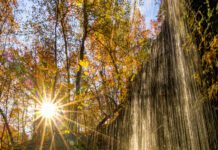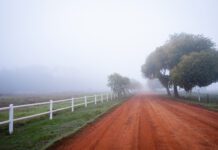On-the-Water Activities
Around Oklahoma, there are marinas and clubs aplenty, plus venues to enjoy your favorite on-the-water sport. Overholser Kayak Club in Bethany offers competitive youth paddling opportunities, along with Olympic and Paralympics training. Riversport OKC on the Oklahoma River presents guests with surfing, whitewater rafting, kayaking, tubing and team sports. Tippa Canoe on the Mountain Fork River near Broken Bow Lake rents everything needed for kayaking, canoeing and tubing.
Licensing isn’t usually required for non-motorized boating sports, but training and experience are often needed for participating at certain locations. Licensing for safety is recommended for scuba diving. For most activities, life jackets are a must. As well, dry bags keep personal items safe, including cell phones, sun protection, insect repellant, water bottles, sunglasses and clothing. A headlamp or flashlight is critical if you are caught on the water after dark.
Lake Tenkiller is the state’s deepest lake and is the “divers’ choice” due to its clear waters. Other major dive areas include Broken Bow Lake, Lake Murray and Chickasaw National Recreation Areas.
What do you need for Oklahoma water activities?

Surfers stand on a surfboard and catch a wave as it breaks toward shore.
Equipment:
• Surfboard & surfboard leash
• Wetsuit & fins
• Surf wax

Kayaking involves propelling a small narrow boat across water using a double-bladed paddle.
Equipment:
• Kayak
• Paddle
• Bilge pump

Stand-up paddleboarding (SUP) involves standing on a large, stable board and using a long paddle to propel yourself across water.
Equipment:
• SUP board
• SUP paddle
• Pump for inflatable SUP
• Fin(s)
• SUP leash
• Rescue whistle
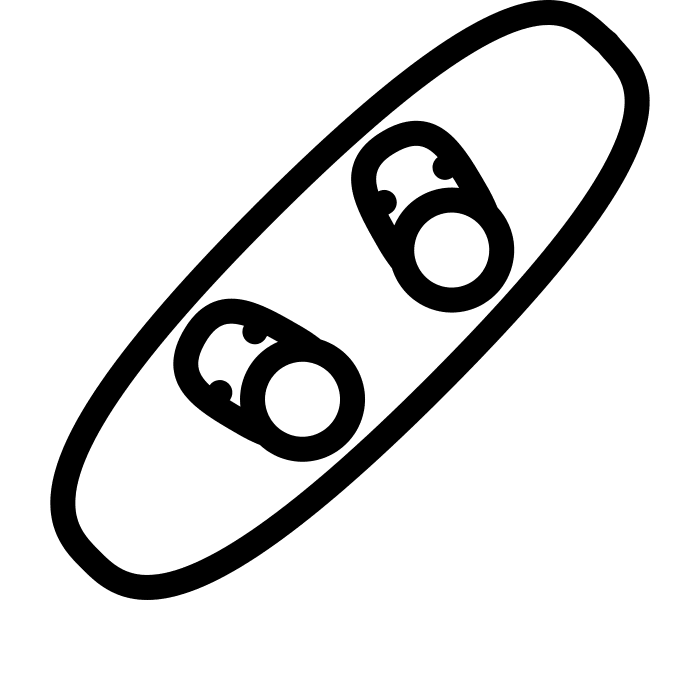
Wakeboarding involves standing on a board while towed behind a motorboat across the wake.
Equipment:
• Wakeboard
• Rope with handles
• Bindings
• Helmet
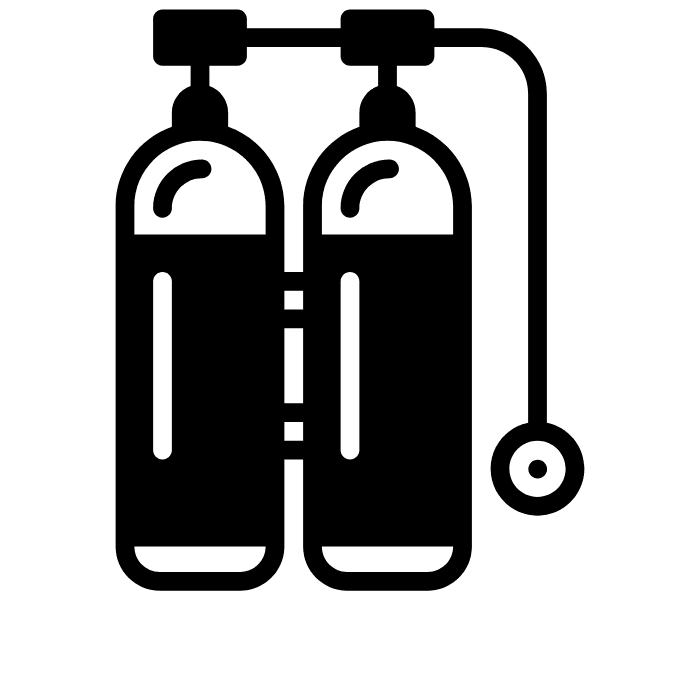
Scuba divers breathe underwater using a self-contained underwater breathing apparatus (SCUBA).
Equipment:
• Buoyancy control device
• Regulator
• Mask & defog
• Snorkel & fins
• Wetsuit
• Surface marker buoy
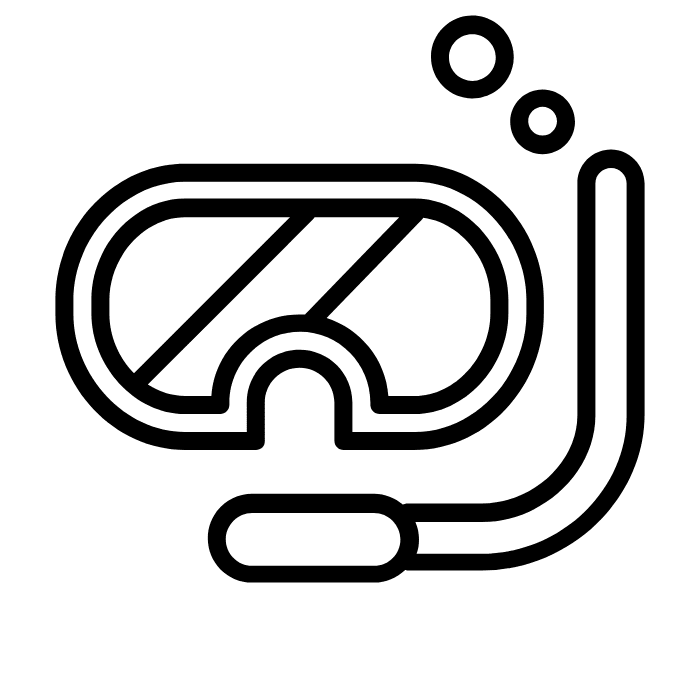
Snorkeling involves floating or swimming near the water surface, and breathing through a snorkel while wearing a mask and fins.
Equipment:
• Mask & fins
• Snorkel
General Lake Safety
• Being in physical control of any vessel while under the influence of alcohol, drugs or other intoxicating substances is illegal. Alcohol is a major contributor to boating accidents and fatalities.
• You need a wearable PFD (Personal Flotation Device) for every person onboard your boat.
• Besides the driver, use a spotter for tow sports to ensure no one is left behind.
• Check all equipment and lake conditions before leaving.
• Keep engines off when people are in the water around your boat.
• Control your wake so as not to disturb others.
• Be aware of possible hazards and weather conditions.
• Respect water and beach closures.
• Use the buddy system.
• Think before diving.
• Avoid polluted or algae-affected water.
Boats and Jet Ski Maintenance
Proper maintenance extends a watercraft’s life. And remember, these devices are a major investment, so treat them as such!
The Boat Maintenance Checklist:
• Check batteries and battery cables before every outing.
• Use battery maintenance charger for extended periods of non-use.
• Replace battery every four to five seasons.
• Always use fuel with zero ethanol.
• Use a marine-specific fuel stabilizer to prevent oxidation and phase separation.
• Check engine oil before every outing.
• Remove propeller and check propshaft a few times a season.
• Learn the steps necessary to ‘winterize’ your boat and prepare the watercraft after the summer season is over.
The Jet Ski Maintenance Checklist:
• Consult the owner’s manual for model-specific procedures.
• At least once annually, change engine fuel and filter, drain pump oil and replace with new oil, add grease to all seals and bearing fittings, and lubricate parts.
• Maintain engine fluids.
• Dispose of old fuel responsibly.
• Check for loose or damaged parts.
• Clean the exterior.
• Use a PWC Lift.
• Learn the steps necessary to ‘winterize’ your jet ski and prepare the watercraft after the summer season is over.
Water Quality 101
Water pollutants may cause serious illnesses and even death for humans and animals. In Oklahoma, pollutants may include heavy metals, with mercury sometimes found at unsafe levels in fish. As well, ammonia, sulfate and dissolvable solids are problems in Oklahoma’s bodies of water. Urban stormwater, sewage seepage, agricultural runoff, industrial discharge, erosion and internal lake processes are also possible culprits.
Remember the old saying as it relates to entering bodies of water: “If it’s green on top, stop!” No person or animal should touch or drink water if blue-green algae (BGA), aka cyanobacteria, possibly appears. BGA may be: blue, bright green, brown or red, and appear as foam, scum or mats that float on water surfaces; a pea soup-like substance; or floating on/near the shoreline. Sometimes caused by nitrogen from fertilizer, BGA may cause serious illnesses or death. Seek immediate medical attention if contact is made.
Never pollute. The Oklahoma Water Resources Board, the U.S. Army Corps of Engineers, Tulsa District and other entities monitor lakes for all kinds of issues. Visit travelok.com/state-parks/lake-conditions for a Water Safety Checklist, and current, individual lake conditions. Report BGA to the Oklahoma Department of Environmental Quality at 1-800-522-0206.
General Lake Safety
• Being in physical control of any vessel while under the influence of alcohol, drugs or other intoxicating substances is illegal. Alcohol is a major contributor to boating accidents and fatalities.
• You need a wearable PFD (Personal Flotation Device) for every person onboard your boat.
• Besides the driver, use a spotter for tow sports to ensure no one is left behind.
• Check all equipment and lake conditions before leaving.
• Keep engines off when people are in the water around your boat.
• Control your wake so as not to disturb others.
• Be aware of possible hazards and weather conditions.
• Respect water and beach closures.
• Use the buddy system.
• Think before diving.
• Avoid polluted or algae-affected water.


